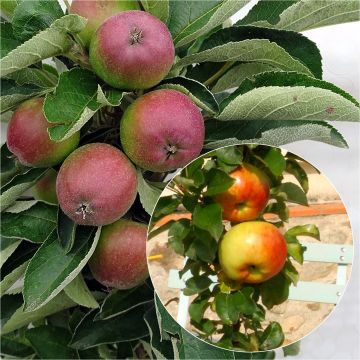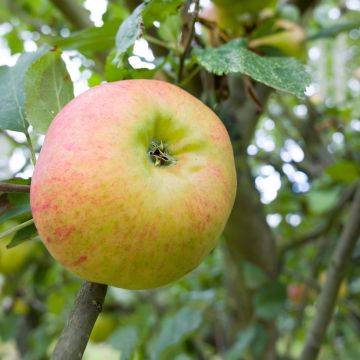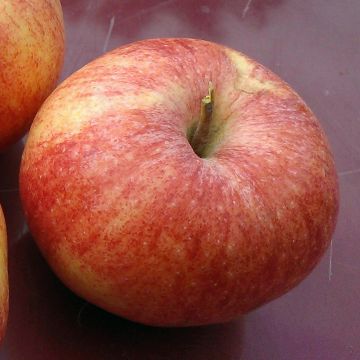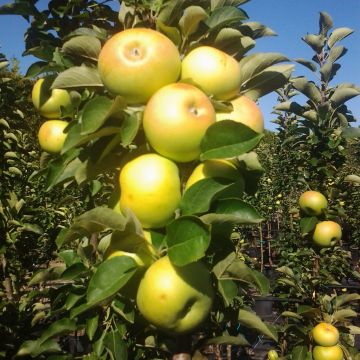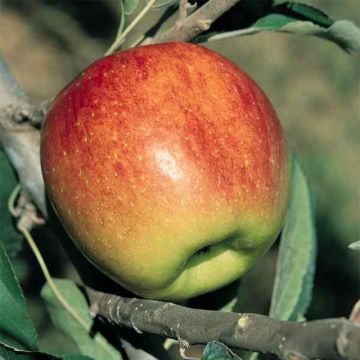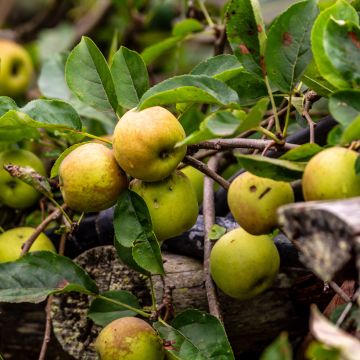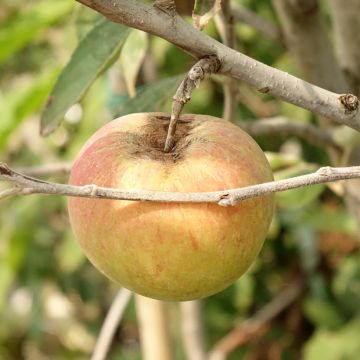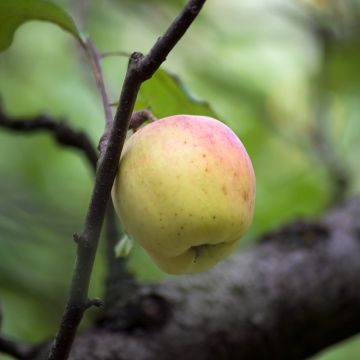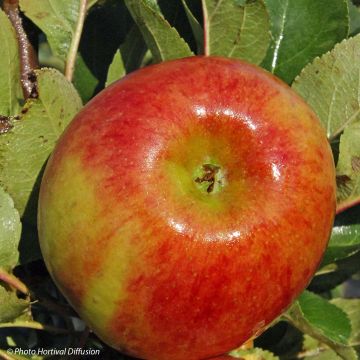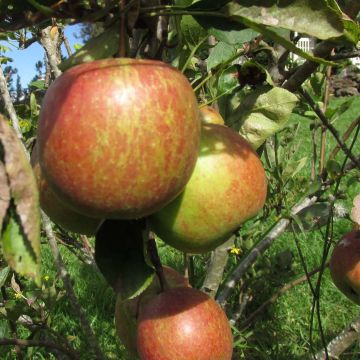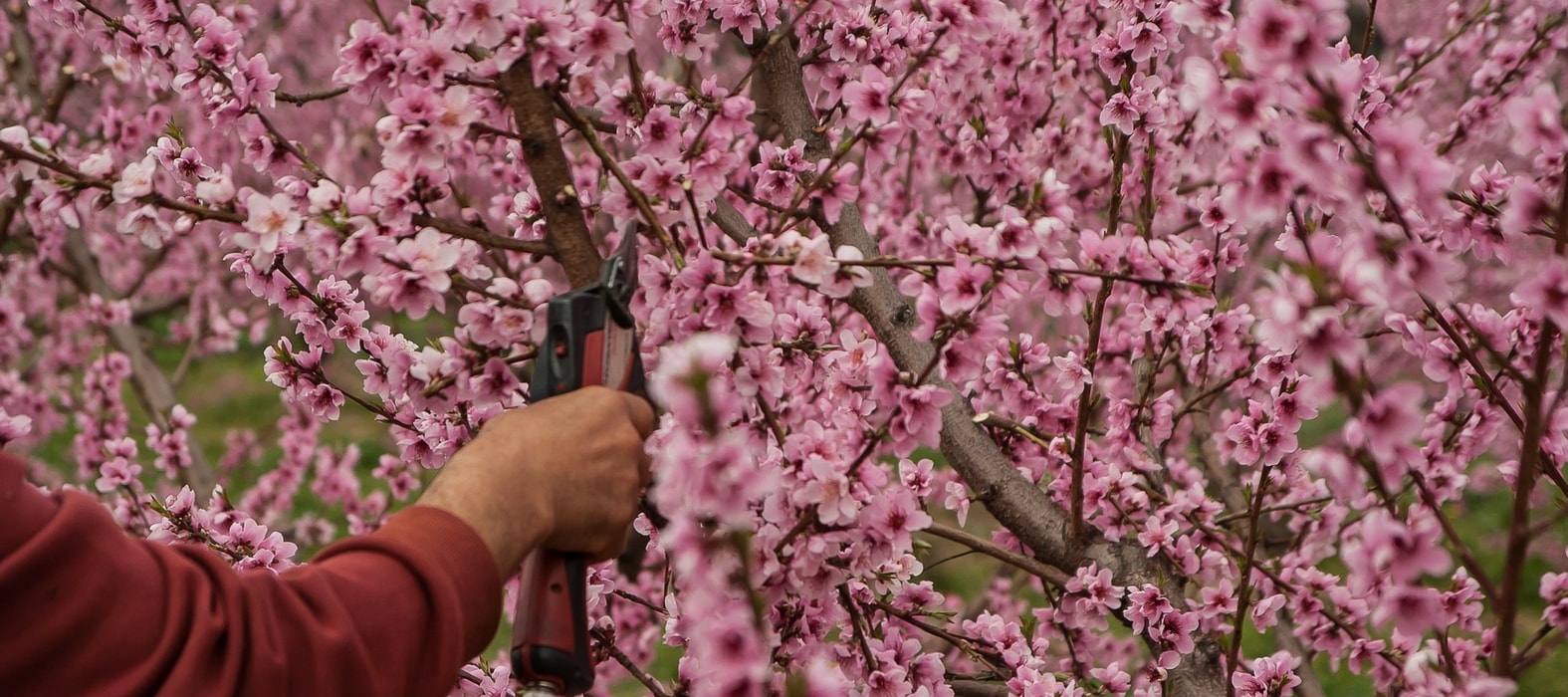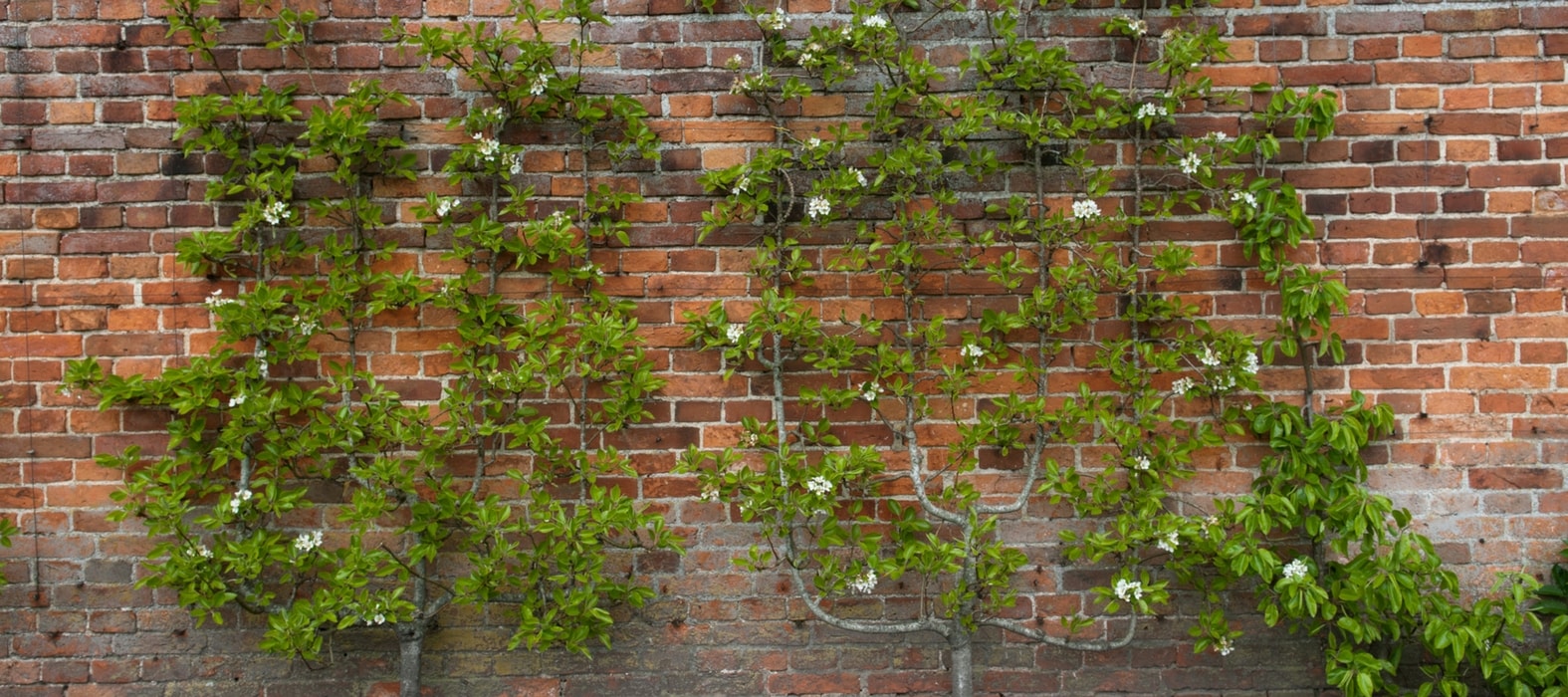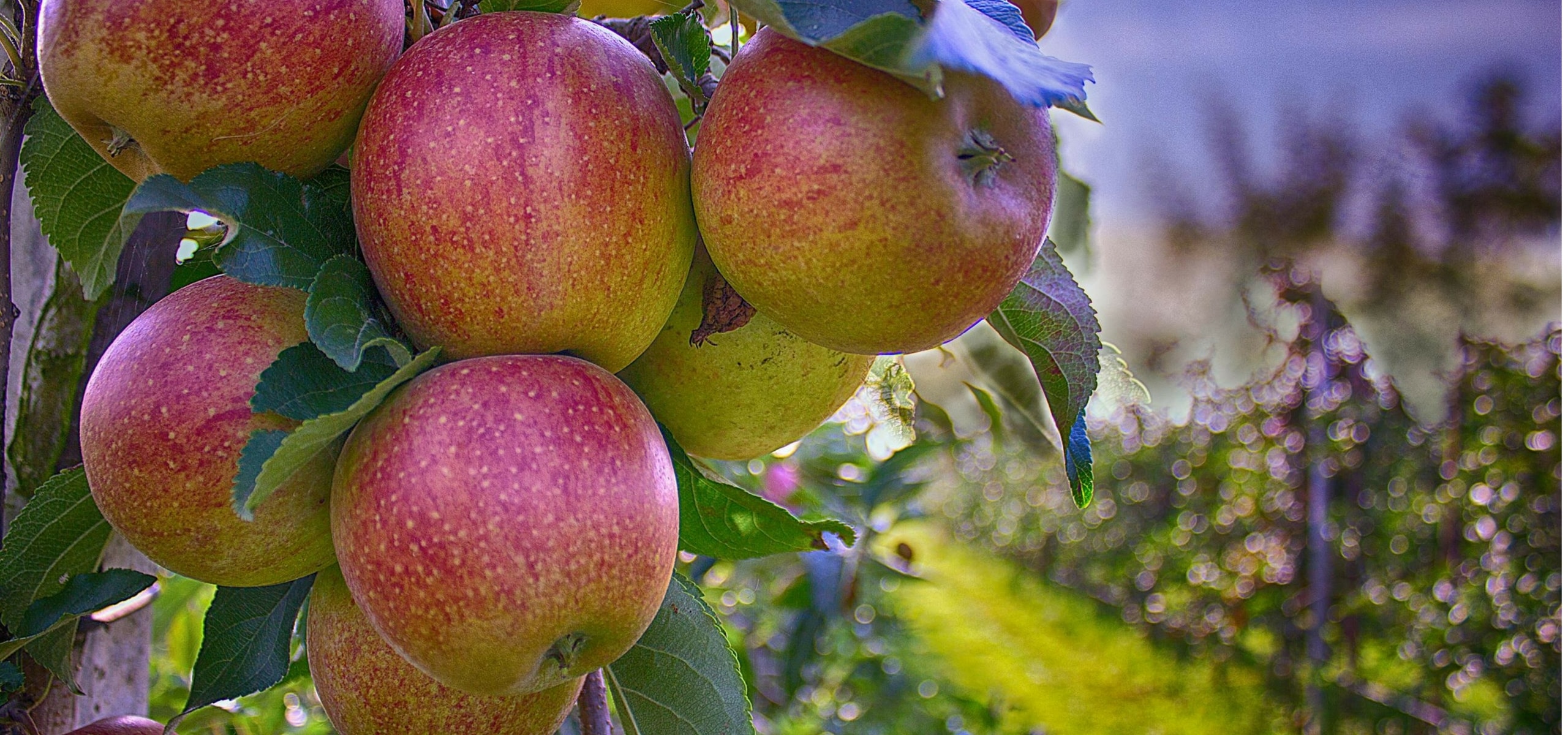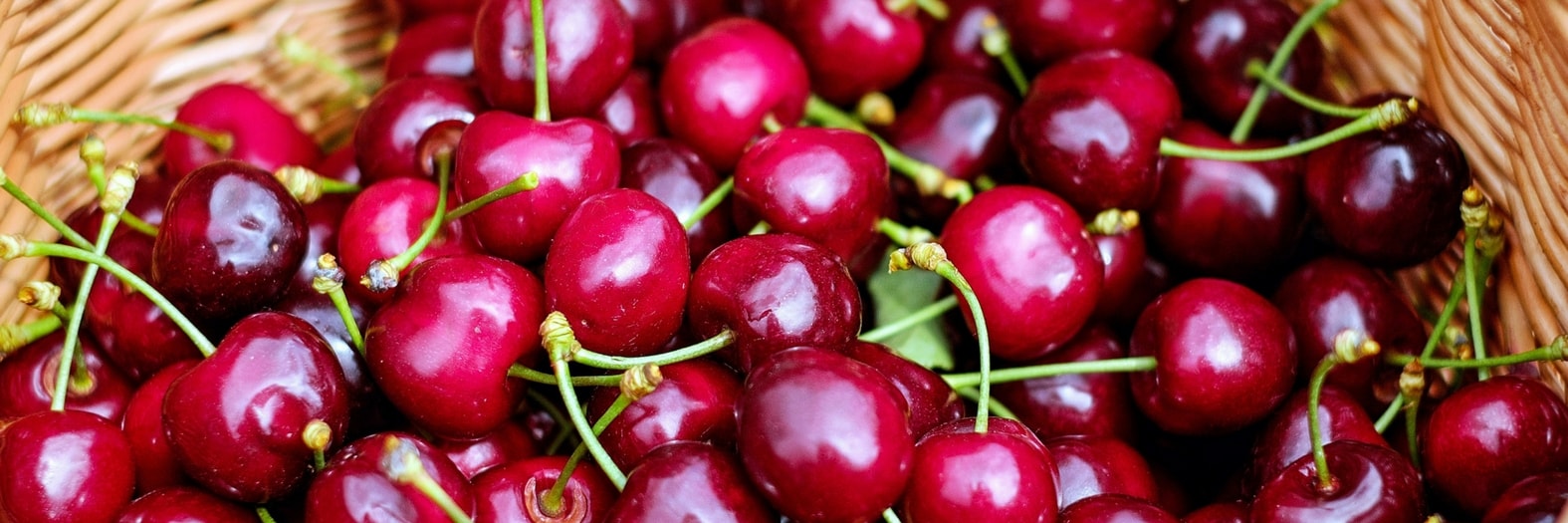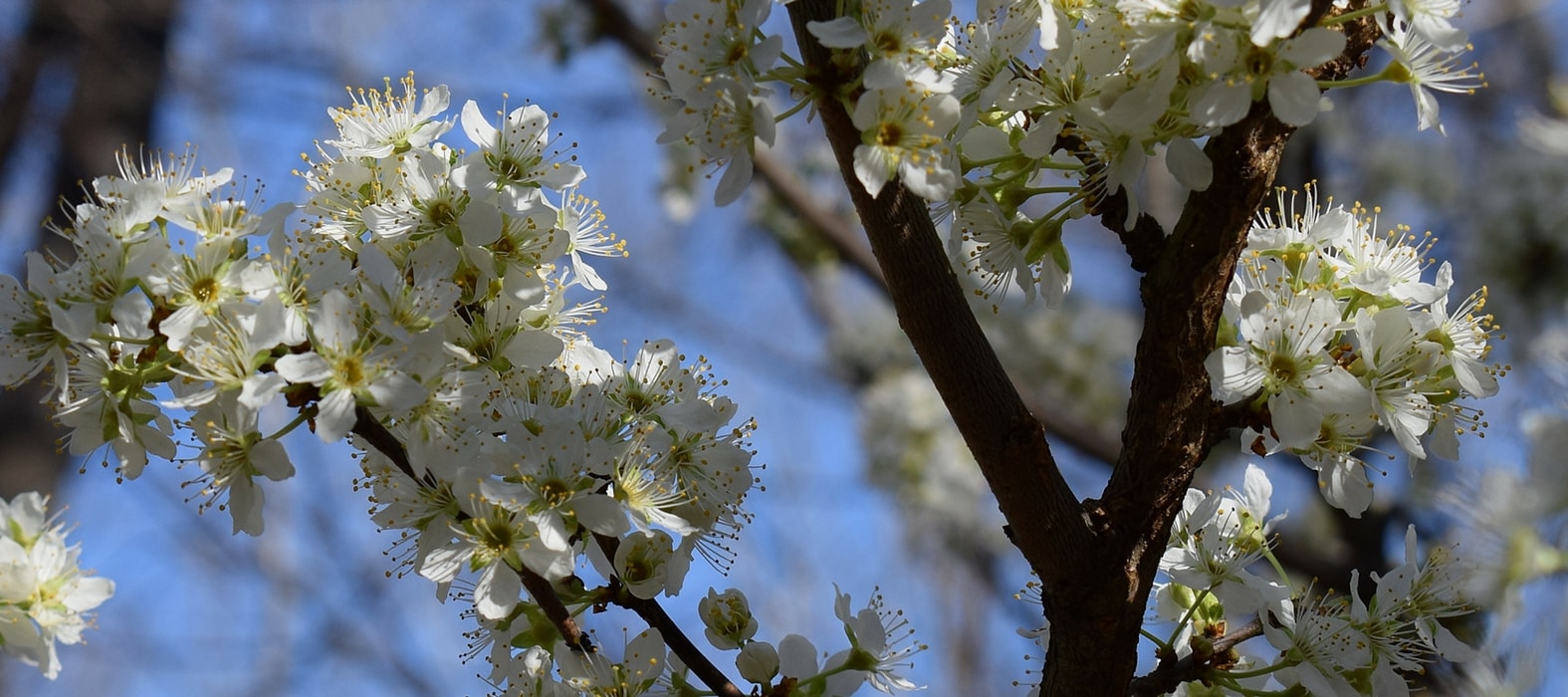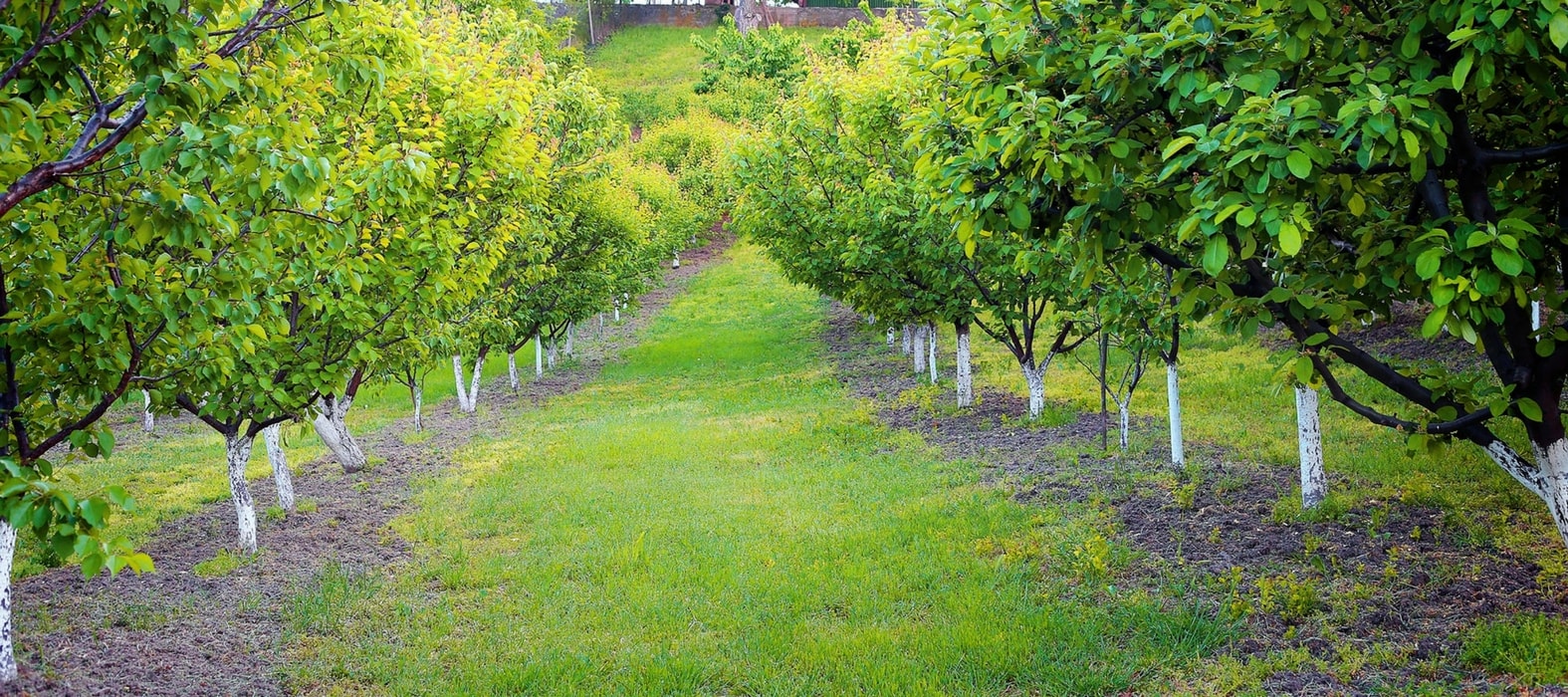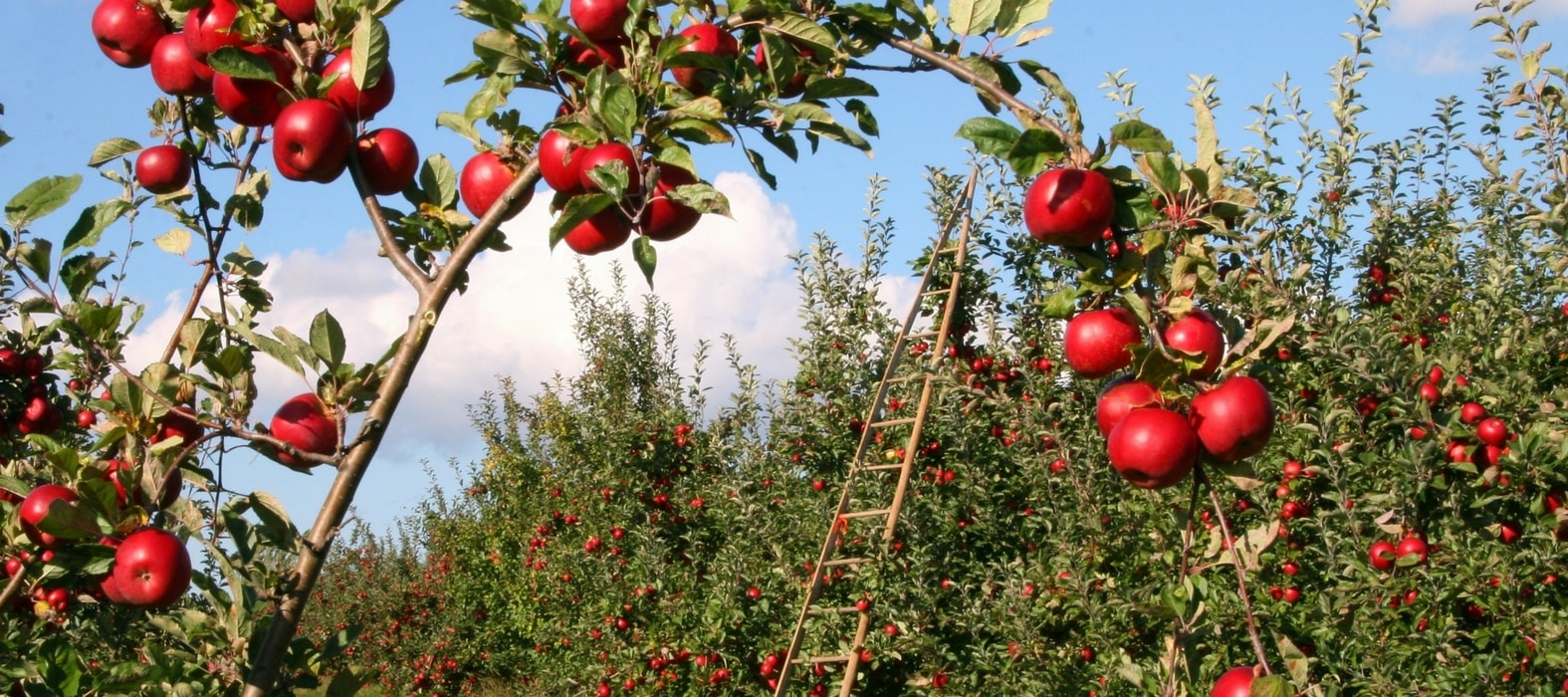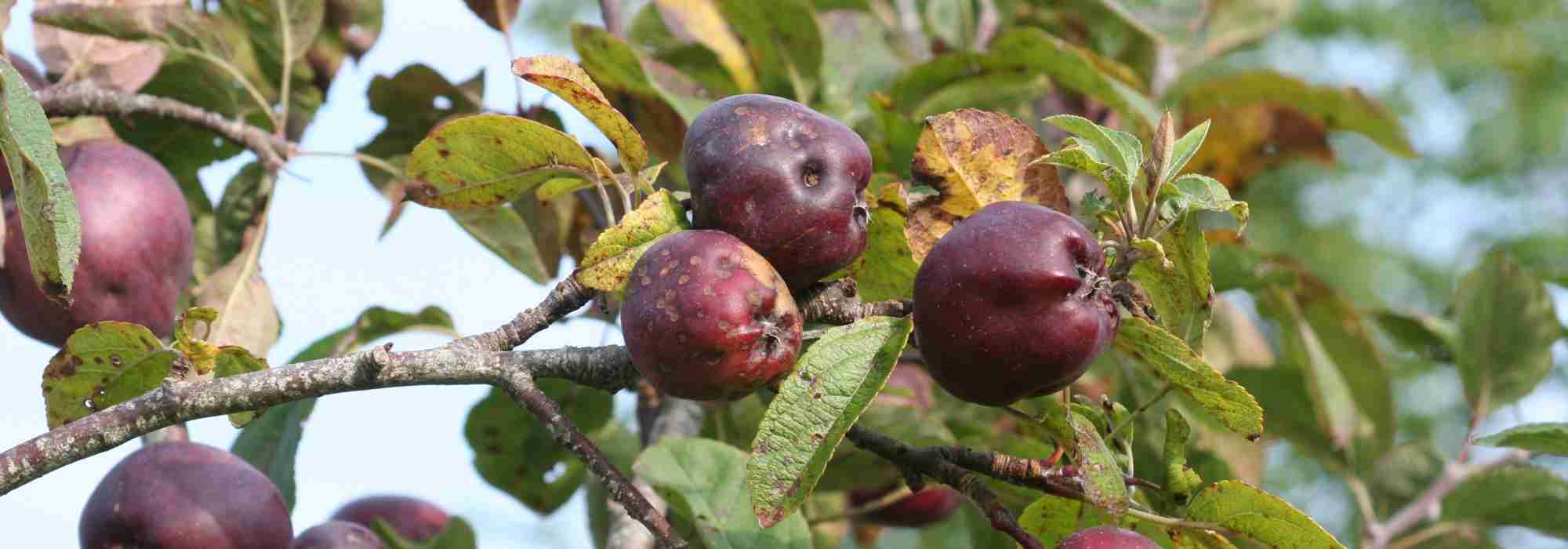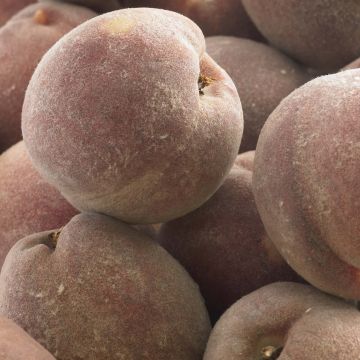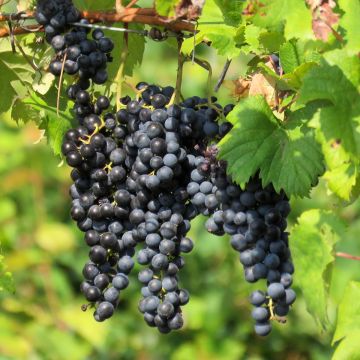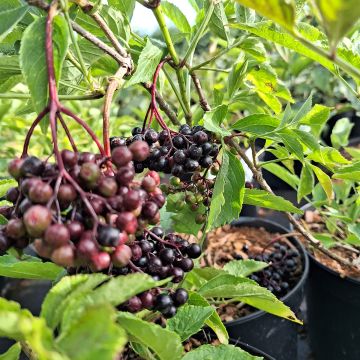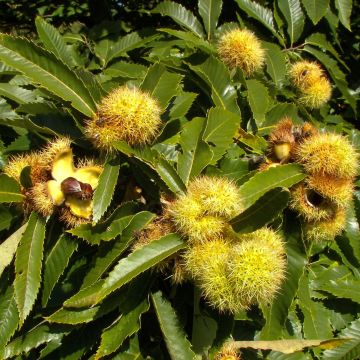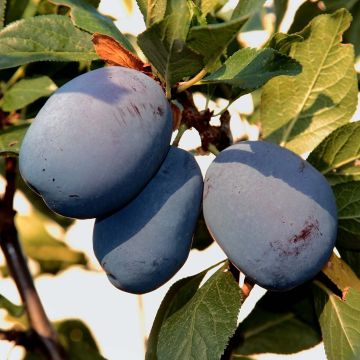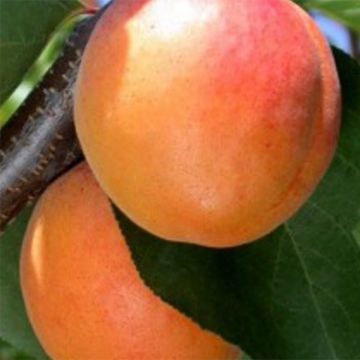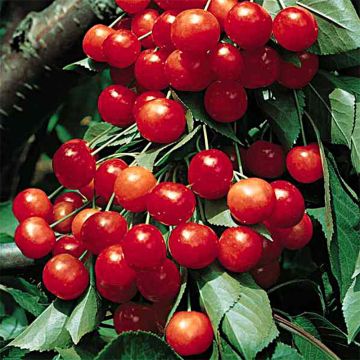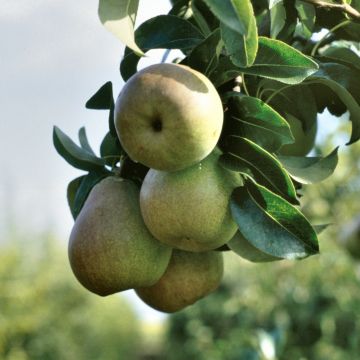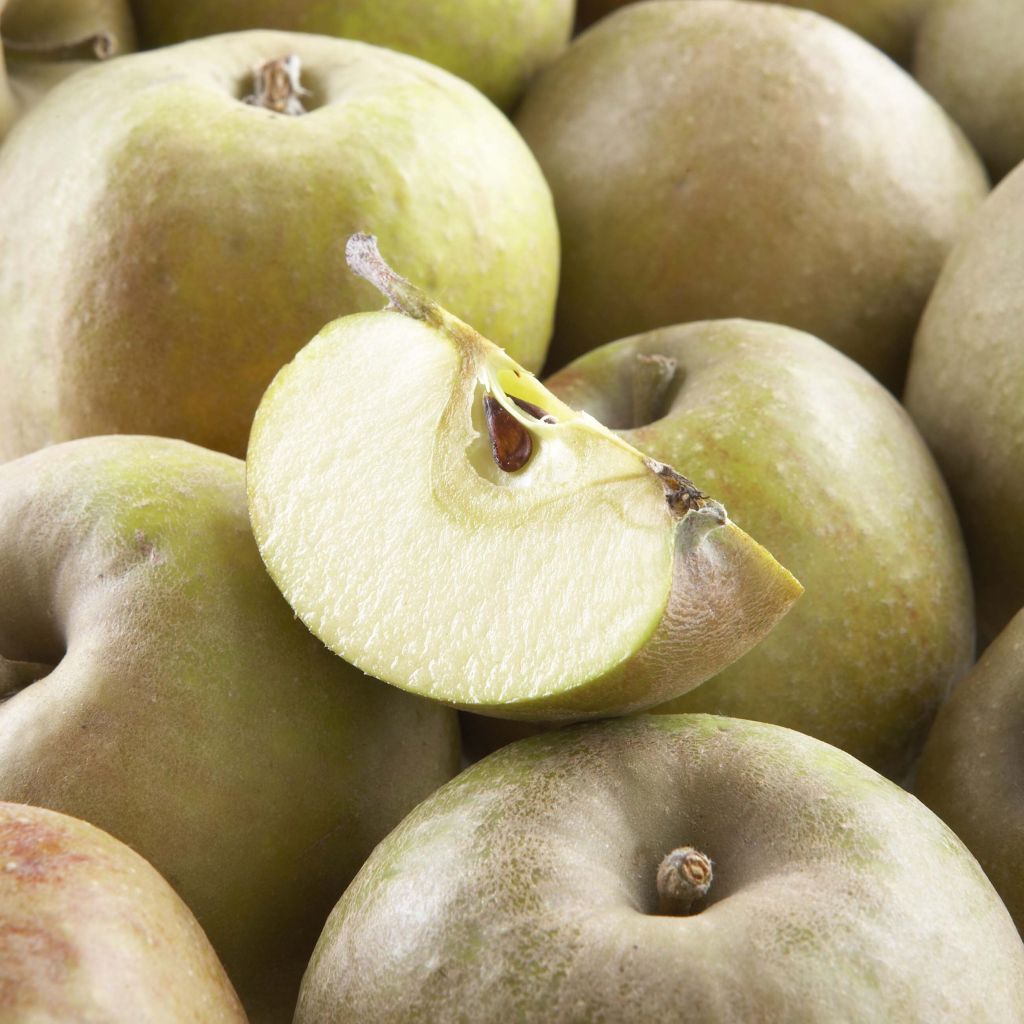

Apple Tree Court Pendu - Malus domestica
Apple Tree Court Pendu - Malus domestica
Malus domestica Court Pendu
Apple, Orchard apple, Table apple, Cultivated apple
I received a beautiful tree, however, I was disappointed upon reception as it had 4 lovely branches broken and several friction wounds. I pruned it all and applied some clay, but oh well.
ELODIE, 03/04/2024
Special offer!
Receive a €20 voucher for any order over €90 (excluding delivery costs, credit notes, and plastic-free options)!
1- Add your favorite plants to your cart.
2- Once you have reached €90, confirm your order (you can even choose the delivery date!).
3- As soon as your order is shipped, you will receive an email containing your voucher code, valid for 3 months (90 days).
Your voucher is unique and can only be used once, for any order with a minimum value of €20, excluding delivery costs.
Can be combined with other current offers, non-divisible and non-refundable.
Home or relay delivery (depending on size and destination)
Schedule delivery date,
and select date in basket
This plant carries a 6 months recovery warranty
More information
We guarantee the quality of our plants for a full growing cycle, and will replace at our expense any plant that fails to recover under normal climatic and planting conditions.
Description
The 'Court Pendu' Apple is a very ancient variety, known since the 15th century. It offers tasty, flat apples, whose green-grey skin turns yellow, sometimes tinged with red when ripe. These fruits are harvested in October and can be consumed from December onwards. Their flesh is firm, very sweet, fragrant, and aromatic. In the past, it was believed to have medicinal properties.
The 'Court Pendu' Apple produces an excellent apple, versatile and equally good raw or cooked. It also has the advantage of long storage: at least until April and sometimes even up to a year, if stored under very good conditions.
Hardy, this Apple tree can withstand temperatures as low as -30°C (-22°F) and blooms in April. It is a disease-resistant variety, including scab.
This apple tree is sometimes referred to as self-fertile. In reality, it is very minimally fertile and should therefore be considered an inter-fertile variety. To ensure abundant fruiting, it should be planted near varieties that bloom at the same time, such as 'Reine des Reinettes'.
The Apple tree (Malus domestica) is a fruit tree belonging to the Rosaceae family. It is grown almost everywhere in the world and includes countless varieties, both ancient and modern, that produce apples of various sizes and flavours.
Apple trees are native to Europe, and especially France, where they have been present since ancient times. They are hardy, with some varieties tolerating temperatures as low as -30°C (-22°F), and can be grown in most regions.
Domestic apple trees typically reach a height of around ten metres, with a similar spread. However, their size can be significantly smaller depending on the vigour of the rootstock used. They generally have a tall trunk that naturally spreads out. They can take various forms (bush, half-standard, standard...) and can be trained in numerous ways (column, cordon, espalier...).
Apple leaves are deciduous and arranged alternately on the branches. Their blades are ovate and toothed. They have a dark green upper surface and a whitish, slightly fuzzy lower surface.
In spring, the apple tree produces white or pinkish-white flowers grouped in corymbs. Apple flowers consist of 5 petals, surrounding a core made up of about 20 stamens. They give rise to fleshy fruits (technically drupes), spherical and filled with pips. The color, size, flavor, and storage duration of the fruits vary depending on the variety.
Rarely self-fertile, the apple tree is a fruit tree that requires the presence of other apple trees, blooming at the same time and in close proximity, to bear fruit.
Apple trees can be grown in all climates, but particularly thrive in temperate regions, preferably humid ones, such as Normandy. They enjoy sunny locations in reasonably moist and fertile soil. They are traditionally planted in orchards but can also be grown as standalone trees or even hedges.
Apple trees are easy fruit trees to grow, requiring at least some thinning pruning. Proper fruiting pruning will prevent alternate bearing (fruiting every other year). Regular or biennial application of well-decomposed compost also enhances apple tree productivity.
Apples are harvested in late summer and autumn and can sometimes be stored for a long period in a cellar and eaten until early spring. Apples are suitable for a wide range of culinary preparations (compotes, pies, jellies) but can also be used to make apple juice or cider.
For transport reasons, our taller scions may be pruned before shipment. They are suitable for all common forms of training: cordons, espaliers, bushes, half-standards, and low standards, except for high standards. If you want more information or advice on training your fruit trees, do not hesitate to contact us.
This fruit tree is delivered in a "ready-to-plant" root ball. When planting, the root ball should be planted as it is. The biodegradable tontine that surrounds the root ball and protects the rootlets will decompose naturally during the plant's growth. By doing so, you ensure better establishment.
Apple Tree Court Pendu - Malus domestica in pictures
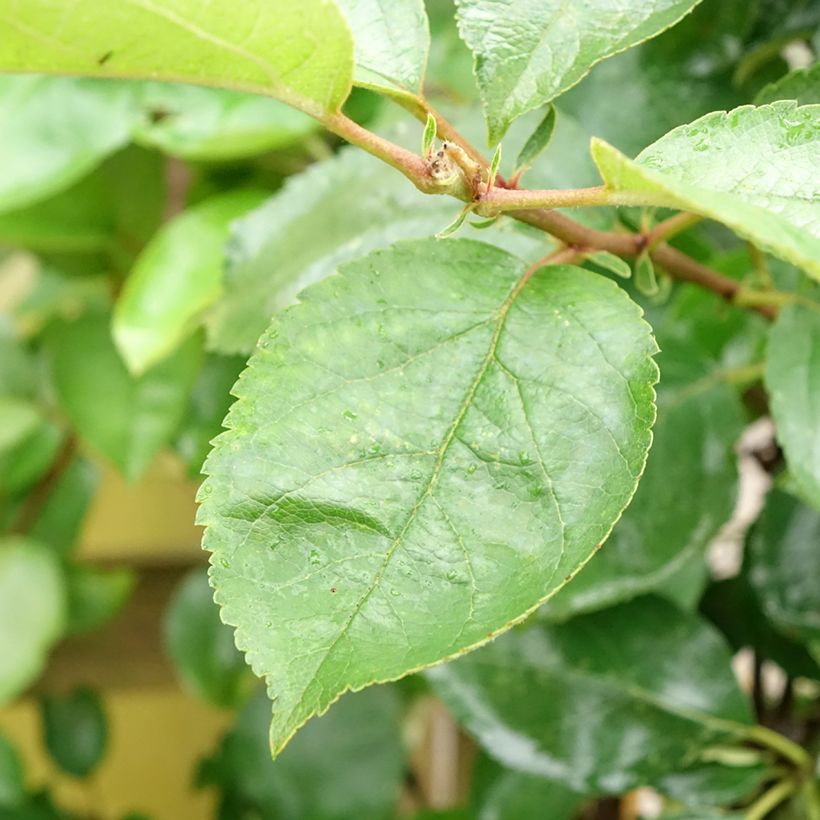

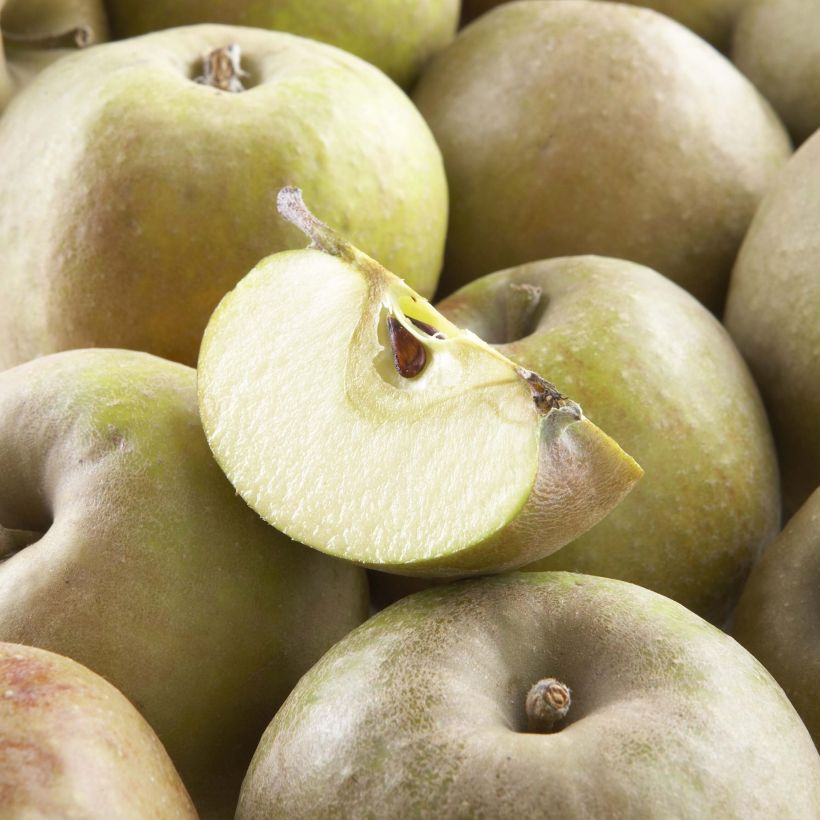

Plant habit
Fruit
Flowering
Foliage
Botanical data
Malus
domestica
Court Pendu
Rosaceae
Apple, Orchard apple, Table apple, Cultivated apple
Cultivar or hybrid
M106 (Ready-to-plant root ball - Goblet)
Other Apple trees
View all →Planting and care
Choose, for your Short Pendu Apple Tree, a sunny location, the soil can be slightly chalky or acidic but not excessive. Dig a wide planting hole at least 3 times the volume of the root ball. Simultaneously add organic matter (potting soil, compost...) and a base fertilizer like crushed horn. Do not bury the graft collar. Stake if necessary. Water abundantly, even in winter, even if it rains. Fruit trees are ideally planted between October and March, outside of the freezing period. Container-grown plants can be planted all year round except during periods of high heat or frost.
You can add a small handful of wood ash, rich in potash, during winter, which will improve fruiting. Watch out for potential aphid attacks during the season. A white powdery fungus, powdery mildew, may appear on the leaves in summer, but it does not harm fruit development in gardens. Harvest takes place in September. Only keep the picked fruits. Apples should be stored with the stem facing downwards, on racks or in crates. Choose a preferably completely dark, dry, cool location, but frost-free.
Planting period
Intended location
Care
Planting & care advice
-
, onOrder confirmed
Reply from on Promesse de fleurs
Similar products
Haven't found what you were looking for?
Hardiness is the lowest winter temperature a plant can endure without suffering serious damage or even dying. However, hardiness is affected by location (a sheltered area, such as a patio), protection (winter cover) and soil type (hardiness is improved by well-drained soil).

Photo Sharing Terms & Conditions
In order to encourage gardeners to interact and share their experiences, Promesse de fleurs offers various media enabling content to be uploaded onto its Site - in particular via the ‘Photo sharing’ module.
The User agrees to refrain from:
- Posting any content that is illegal, prejudicial, insulting, racist, inciteful to hatred, revisionist, contrary to public decency, that infringes on privacy or on the privacy rights of third parties, in particular the publicity rights of persons and goods, intellectual property rights, or the right to privacy.
- Submitting content on behalf of a third party;
- Impersonate the identity of a third party and/or publish any personal information about a third party;
In general, the User undertakes to refrain from any unethical behaviour.
All Content (in particular text, comments, files, images, photos, videos, creative works, etc.), which may be subject to property or intellectual property rights, image or other private rights, shall remain the property of the User, subject to the limited rights granted by the terms of the licence granted by Promesse de fleurs as stated below. Users are at liberty to publish or not to publish such Content on the Site, notably via the ‘Photo Sharing’ facility, and accept that this Content shall be made public and freely accessible, notably on the Internet.
Users further acknowledge, undertake to have ,and guarantee that they hold all necessary rights and permissions to publish such material on the Site, in particular with regard to the legislation in force pertaining to any privacy, property, intellectual property, image, or contractual rights, or rights of any other nature. By publishing such Content on the Site, Users acknowledge accepting full liability as publishers of the Content within the meaning of the law, and grant Promesse de fleurs, free of charge, an inclusive, worldwide licence for the said Content for the entire duration of its publication, including all reproduction, representation, up/downloading, displaying, performing, transmission, and storage rights.
Users also grant permission for their name to be linked to the Content and accept that this link may not always be made available.
By engaging in posting material, Users consent to their Content becoming automatically accessible on the Internet, in particular on other sites and/or blogs and/or web pages of the Promesse de fleurs site, including in particular social pages and the Promesse de fleurs catalogue.
Users may secure the removal of entrusted content free of charge by issuing a simple request via our contact form.
The flowering period indicated on our website applies to countries and regions located in USDA zone 8 (France, the United Kingdom, Ireland, the Netherlands, etc.)
It will vary according to where you live:
- In zones 9 to 10 (Italy, Spain, Greece, etc.), flowering will occur about 2 to 4 weeks earlier.
- In zones 6 to 7 (Germany, Poland, Slovenia, and lower mountainous regions), flowering will be delayed by 2 to 3 weeks.
- In zone 5 (Central Europe, Scandinavia), blooming will be delayed by 3 to 5 weeks.
In temperate climates, pruning of spring-flowering shrubs (forsythia, spireas, etc.) should be done just after flowering.
Pruning of summer-flowering shrubs (Indian Lilac, Perovskia, etc.) can be done in winter or spring.
In cold regions as well as with frost-sensitive plants, avoid pruning too early when severe frosts may still occur.
The planting period indicated on our website applies to countries and regions located in USDA zone 8 (France, United Kingdom, Ireland, Netherlands).
It will vary according to where you live:
- In Mediterranean zones (Marseille, Madrid, Milan, etc.), autumn and winter are the best planting periods.
- In continental zones (Strasbourg, Munich, Vienna, etc.), delay planting by 2 to 3 weeks in spring and bring it forward by 2 to 4 weeks in autumn.
- In mountainous regions (the Alps, Pyrenees, Carpathians, etc.), it is best to plant in late spring (May-June) or late summer (August-September).
The harvesting period indicated on our website applies to countries and regions in USDA zone 8 (France, England, Ireland, the Netherlands).
In colder areas (Scandinavia, Poland, Austria...) fruit and vegetable harvests are likely to be delayed by 3-4 weeks.
In warmer areas (Italy, Spain, Greece, etc.), harvesting will probably take place earlier, depending on weather conditions.
The sowing periods indicated on our website apply to countries and regions within USDA Zone 8 (France, UK, Ireland, Netherlands).
In colder areas (Scandinavia, Poland, Austria...), delay any outdoor sowing by 3-4 weeks, or sow under glass.
In warmer climes (Italy, Spain, Greece, etc.), bring outdoor sowing forward by a few weeks.































